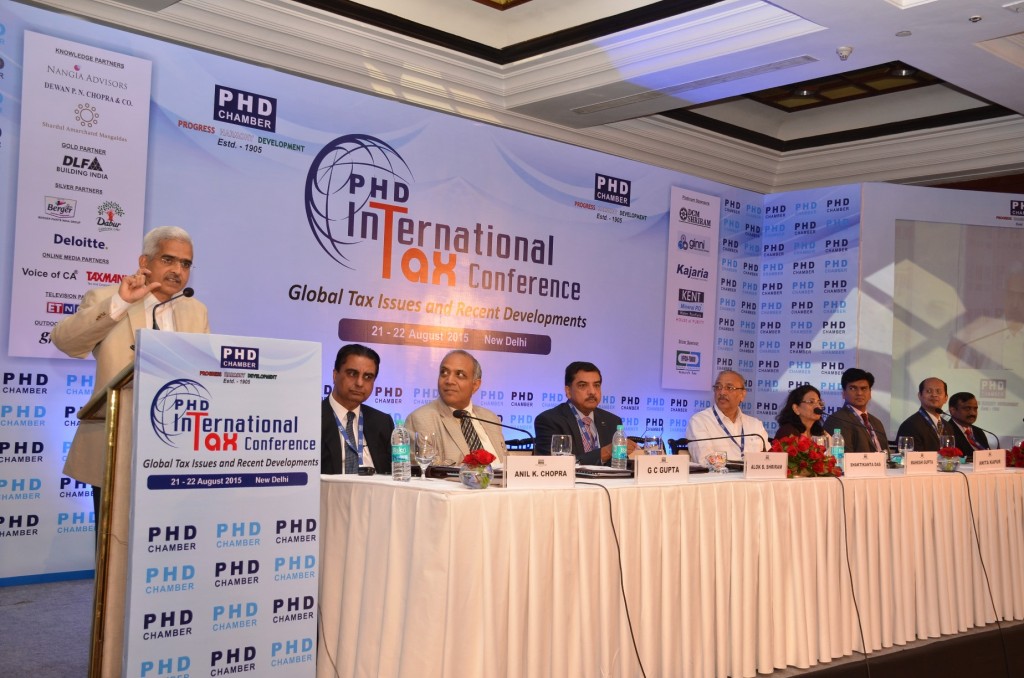~Transforming the red tape to a red carpet for attracting foreign investment~
New Delhi, 23rd August 2015: An informed dialogue on current global tax issues and developments was successfully concluded at the PHD International Tax Conference held in New Delhi on 21st and 22nd Aug’15. The Chief Guest for the conference was Mr. Shaktikanta Das, Secretary (Revenue), Ministry of Finance with Ms. Anita Kapur, Chairperson, CBDT, and Mr. G.C. Gupta, Vice President ITAT as the Guest of Honour.
The Conference witnessed experts deliberating on various significant International Tax issues including Transfer Pricing; Cross Border Investments; Automatic Exchange of Information; Base Erosion & Profit Shifting and deliberated on the recently enacted Black Money (Undisclosed Foreign Income & Assets) and Imposition of Tax Act, 2015.
Addressing the two-day International Tax Conference, Mr. Shaktikanta Das, Secretary Revenue said , “the government would shortly settle tax related disputes with close to 120 American companies, entities from Japan and other such countries. The government will put in place a just and fair tax regime to collect revenues required for growth and avoid tax regime that is painful.” He further added that India is well involved in International Tax developments including Base Erosion and Profit Shifting and Exchange of Information.
“The Revenue Secretary’s statement that information received from those using the compliance window under the Black Money (Undisclosed Foreign Income & Assets) and Imposition of Tax Act, 2015 would be kept confidential is a welcome assurance. There are doubts and concerns about some aspects of this scheme such as there being no limitation on time period, doubts as to whether tax credits & relief would be allowed under DTAAs, difficulties due to non-availability of old records, particularly where they relate to assets disposed off or bank accounts closed long back etc. The Revenue Secretary has assured that there will be further clarification. These clarifications and FAQs are urgently awaited & may help in a larger number of persons availing the option to make declarations under this window.” Said Mr. Anil K Chopra, Chairman, Direct Tax Committee, PHD Chamber & Managing Partner Dewan P.N. Chopra & Co.
The most significant sessions of the conference addressed the Black Money and Imposition of Tax Act’2015 and the Vision for India from a tax perspective, to make India a preferred investment destination. There is a common national objective to keep a balance between aims of tax administrators on the one hand and tax payers along with tax advisors on the other. The session on Black Money law reinforced the point to give certainty to persons complying under the Black Money Act and the need for further clarification & clarity for removal of potential hardship, which would help meet the objectives behind this regulation. The concluding session on the Vision to make India a preferred destination from a Tax perspective witnessed senior officials representing India’s foremost business partners including U.S.A and Japan.
The Japan Bank for International Cooperation’s survey report on Overseas Business Operations of Japanese Manufacturing Companies 2014 ranked India as their most preferred destination for overseas business. However, they also cited the Indian tax system as complex regime and a big challenge to do business in India; especially when compared to other simpler regimes of countries in including Malaysia, Indonesia and Thailand.
Mr. Paul Frost, Commercial Officer, U.S. Embassy also said that the future is promising with the upcoming strategic and commercial dialogue between India and U.S.A. and it is important for the tax system to support and compliment this joint objective between the two countries to grow bilateral trade to their target levels of USD 500 billion.
If we have a forward looking vision supported by a clear, certain and consistent tax regime, the interest displayed by global investors in the India Opportunity would get the necessary impetus it deserves.. The tax regime must keep pace with the economic liberalization we are witnessing with requisite change in policy from time to time. In addition to focus on a faster mechanism for dispute resolution, the tax policy needs to evolve in a manner that minimizes disputes.
The overall view was to propagate the vision of ‘Make in India’ by increasing ease and efficiency in tax policy and its implementation, which is a key to building conviction among potential investors. Mr. Anil K Chopra added, “Global investors need to be offered a red carpet devoid of red tape to facilitate foreign investments in sectors like infrastructure, energy, manufacturing etc. which would have a direct impact on economic growth.”

